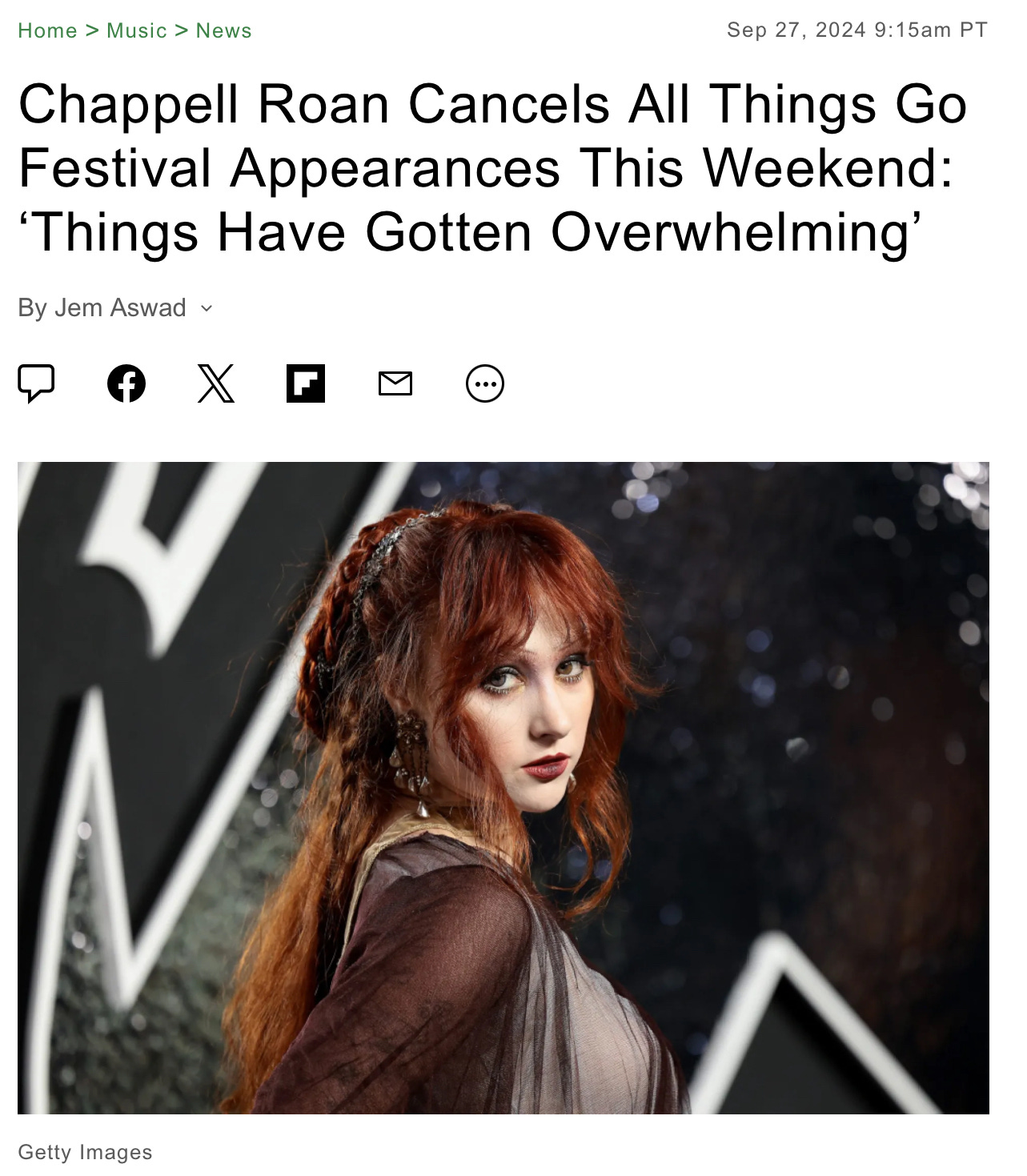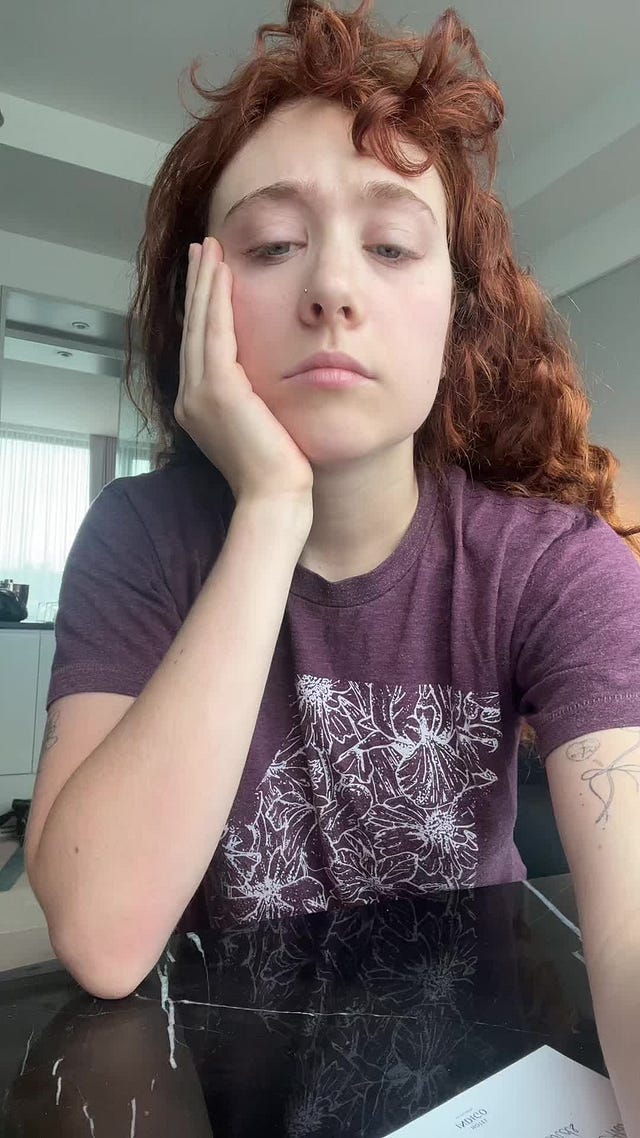The Chappell Roan Think-Piece to End All Chappell Roan Think-Pieces…
What happens when a lesbian gets “a little too famous”
Hi, I'm George Westcott. Now, if you have any knowledge of Pop culture, you must have heard the name Chappell Roan at some point. Chappell Roan's rise to stardom has been almost unprecedented but she also represents something different. I think she's part of the first generation of artists who rose deeply specifically from TikTok. Though not the first, there's something notable about how she wasn't discovered and made a big star. I mean that is the case but she reads as just another TikTok queer person who got some insane levels of fame.

My question has been regarding her recent online treatment as the second coming of Jesus shifting towards something controversial. It stood out to me when I saw a TikTok pointing out "Are you guys still messing with Chappell Roan?". It stood out to me. I thought we had moved away from chronic online discourse on artists and public figures.
My main thought has been that we have hyperconsumer-ized music and the media we interact with. It's not revolutionary, but this idea might help explain why the critique of Chappell Roan feels off. It actively reads as her as a product. The same kind of discussion happens with something like the game industry which has been critiqued for being anti-consumer when in fact they are being over-consumerist, seeing everything as a market. This is also more of an issue considering the fact that Roan’s act is based on drag which has been in conflict with consumerism for ages.
Back on topic, I think the discussion of Chappell Roan strips her of all of her humanity and looks at her as the product. We see the thing that she was first critiqued for, not fully endorsing Kamala Harris, as very reasonable with the only people being legitimately angry are those who are die-hard Kamala voters. This part of the discussion came off as just a very vague discourse where people felt more angry than anything. She literally said that she was voting for her, just not endorsing her which is, and I have to reiterate this, an absolutely normal position. As an outsider, the US voting system is literally broken with one bad option and one little-lest-bad option, especially with both candidates promising full support for the now-year-old and ongoing genocide in Gaza.
After that, there was a wave of negativity toward Roan, spurred by this primary discussion. This was later followed by her canceling her shows due to her health which spurred the specific discussion of the consumerist type. The main issue is that she somehow had to perform through sickness. I find it interesting that there is always a demand. I feel like we have developed a strange connection with the art being produced with it being so deeply commercialized that we put it on similar needs like our needs to eat or sleep, products we buy and sell. The issue with this paradoxical relationship is not that we demand art from the artist but that we conceive of the art as a product. When we interact with the media, we perceive it through the lens of commerce and I staunchly disagree with this conception.

Of course, it's not great that she canceled her shows but it's not out of the ordinary, let’s be aware of this. In addition, she has given full refunds and promised to do shows as soon as she’s feeling better. I understand the frustration with this specific action but in the end, it is something that probably did need to happen.
In my own opinion, I don't think that a woman can ever do "good" in the eyes of the public, this goes double with a queer woman. In some ways, to be in the public eye is to ask for negativity with no option for anything in the positive, whether you like it or not. Women, in so many of these cases, are famous despite their womanhood. This specific disparity between what we would expect of her as a woman and their position of fame makes us hyper-aware of their position and hyper-critical. Even people who are queer and leftists who would naturally love a figure like Chappell Roan in fame have been some of the most critical of her. I find this situation extremely interesting. Now, I am not the first to posit this idea but to be in the public eye is to be either in an active antagonistic state or in a neutral one. The most positive feelings towards a famous woman would be something like general good vibes, but never anything other than neutrality or negativity. Less and less in ostensibly liberal/leftist circles, we tend to have a wholly positive attitude toward people.
As I wrote in my last essay, we tend to overlook discussions of building community, instead leading with hence the Chris Flemming quote "You say you're a community organiser when you're not even on speaking terms with your roommates."
I'd love to write a super long and detailed essay about hipsters and how we still and maybe forever will live in the hipster age. I find the natural hipster tendency that so many of us exhibit to be incredibly interesting. The main point should be that I feel like the tendency to go against Chappell Roan who honestly has possibly the best with her sudden rise to fame is led by an instinct to go against the mainstream, which has now been shown to be slightly without substance.
A lot of the critics of Chappell Roan have been people who have come out of the woodwork, the people who have now found justification in their distaste. So to highlight this, if you personally don’t like Chappell Roan, that’s a very fair point and more power to you. But I don't think it’s needed to substantiate your position with this moralistic position of her so-called wrongdoing, especially when her wrongdoing is marginal. I know we love to be early haters with things and there’s no greater joy in life when someone you intensely dislike gets canceled. But I think that it’s not behaviour conducive to kindness or in any way constructive, the longest-running tendency on social media. It actively pushes us towards anti-social behaviour, behaviour of hate.
In conclusion, Chappell is still a cultural melting pot as a person. She is the intersection between social media, online queerness, and the music industry and I think analysis of her and what she represents can bring a lot of benefit in understanding each of these different topics. As you can see in my writing, I’m pro-Chappell Roan. However, I don’t want to seem like me telling you that you have to like her. You as a person can have a different taste in music and that is okay or purely dislike her vibe. My point here was to understand and take down the discussion around her for pointless reasons which for me is just a front for people who are trying to find a reason to dislike her. You don’t need a reason and that’s okay. I think that she’s an overall positive figure within the music industry and I think that culturally it has empowered a lot of people who needed it.
As I am finishing this essay, I have begun to see a lot of people putting out content about this specific issue. That’s always a frustrating thing to face as a writer, that you’ve been beaten to the punch. However, there is some relief in knowing that I am not alone in my thoughts and that people have similar opinions about this whole deal. I have been adapting to Rome recently and it's not been an easy process, hence maybe being out of the loop. Anyway, I would like to just put out this collection of thoughts as a good practice round for future essays.
I have a lot of ideas in my brain at the moment and hope you’ll stick around for the future of this publication. Also, as you might have noticed, I have done a full rebrand of the publication with new intro images for the articles. Don’t fret however, I will still continue to place my doodles in addition to the intro images. The rebrand is mostly so that I can use archival footage more in my articles instead of relying on doodles to make my points.
Regardless, this is a shorter essay in general since I’m trying to write more concisely, so let me know what you think.







